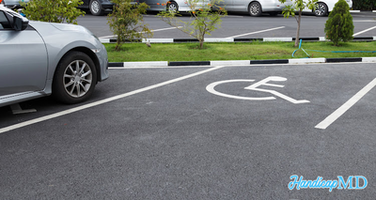
Myths vs. Facts: Debunking Common Misconceptions about Handicap Placards in Arkansas
Introduction
In this comprehensive guide, we will delve into the world of handicap placards in Arkansas, aiming to debunk the prevalent myths surrounding them and present factual information to help individuals better understand their purpose and usage. Handicap placards are essential tools that provide accessibility and convenience to those with disabilities, allowing them to park in designated spaces close to entrances. Unfortunately, misinformation often circulates, leading to misunderstandings and misuse of these passes. Let's separate fact from fiction and gain valuable insights into acquiring, using, and respecting handicap placards in Arkansas.
Myths vs. Facts: Debunking Common Misconceptions about Handicap Placards in Arkansas
Myth 1: Disability Permits are Easy to Obtain Illegally
It is a common misconception that obtaining a handicap permit in Arkansas is a straightforward process and that people often abuse the system to gain privileges they are not entitled to. However, this is far from the truth. The Department of Finance and Administration (DFA) in Arkansas strictly regulates the issuance. Applicants must meet specific eligibility criteria, and the application requires documentation from a qualified medical professional supporting the need for it.
Fact 1: Eligibility Criteria and Medical Documentation
To obtain a permit in Arkansas, individuals must demonstrate a qualifying disability that impairs their mobility. Eligible disabilities include difficulty walking without assistance, the use of assistive devices (such as crutches or wheelchairs), lung impairments, cardiac conditions, and other debilitating issues. Applicants need to submit a completed application form along with a medical certification from a licensed healthcare professional, verifying the disabled parking condition and the need for it.
Myth 2: Disability Permits are Transferable between Individuals
Some mistakenly believe that passes can be transferred between family members or friends. This misconception often leads to misuse. In reality, these are issued to individuals based on their specific disabilities and are non-transferable. It is linked to the person it is issued to, and using it without the authorized person present is a violation of the law.
Fact 2: Non-Transferable Nature of Handicap Permits
Disability tags are assigned to a specific individual and their vehicle. It is against the law to transfer or lend it to someone else, even if they have a qualifying disability. Doing so can result in fines, revocation, and legal consequences. The authorized holder must be present and in the vehicle when utilizing the parking privileges.
Myth 3: Temporary Disabilities Do Not Qualify for Disability Permits
There is a common misconception that only permanent disabilities qualify for disability tags. This leads some to believe that individuals with temporary mobility issues do not deserve these parking privileges. However, AR recognizes that temporary disabilities can also significantly impact an individual's mobility and daily life.
Fact 3: Temporary Disability Eligibility
AR does provide passes for individuals with temporary disabilities, but the duration of eligibility varies. Temporary ones are available for a limited period, generally for six months or less, depending on the medical professional's assessment. These are essential for individuals recovering from surgeries, injuries, or medical conditions that temporarily hinder their mobility.
Myth 4: Disability Permits Allow Parking Anywhere for Free
One common misconception is that disability tag holders can park for free anywhere, without adhering to regular parking regulations. This is not accurate, as permits only provide additional accessibility, not exemption from general parking rules.
Fact 4: Permits and Parking Regulations
Authorized holders in AR can park in designated accessible parking spaces, but they are still subject to other parking regulations. They cannot park in no-parking zones, fire lanes, or areas where parking is restricted for safety reasons. Additionally, they must adhere to parking time limits, unless specifically exempted by local regulations.
Myth 5: Disability Passes are Not Enforced
Some individuals believe that the rules regarding Alaska handicap placards are not strictly enforced, leading to misuse and abuse of these privileges. This is a harmful misconception, as proper enforcement is crucial to ensuring fair access for those who genuinely require accessible parking spaces.
Fact 5: Enforcement of Parking Regulations
In AR, law enforcement takes parking violations seriously. They actively patrol parking lots and public areas to enforce parking regulations. Illegally using a handicap placard can lead to fines, penalties, and potential legal consequences. It is essential to respect these rules to ensure equal accessibility for all.
Myth 6: All Disabilities Are Visible
One of the most widespread myths is that disabilities must be visible to qualify for a disability placard. This misconception often leads to judgment and skepticism when someone with a non-apparent disability uses a parking space.
Fact 6: Not All Disabilities Are Visible
Many disabilities are not immediately apparent to others. Conditions like chronic pain, heart conditions, or respiratory issues may not be visible to the naked eye but can severely limit an individual's mobility and independence. It is essential to avoid making assumptions about a person's need for one based solely on their appearance.
Frequently Asked Questions (FAQs)
FAQ 1: Can I Apply for a Pass Online?
Yes, the Arkansas DFA offers an online application process for passes and for renewals. This option provides a convenient way to apply without visiting a local office. However, keep in mind that you will still need to submit the necessary medical documentation to support your eligibility.
FAQ 2: Can I Use My Out-of-State Pass in Arkansas?
Yes, AR honors out-of-state permits. If you have a valid permit from another state, you can use it in AR during your visit. However, be sure to familiarize yourself with Arkansas-specific parking regulations to ensure compliance.
FAQ 3: Can I Use a Pass That Belongs to Someone Else If They Are Not with Me?
No, it is illegal to use someone else's pass, even if they have a qualifying disability. This is tied to the individual it was issued to, and they must be present and using the vehicle when utilizing the parking privileges.
FAQ 4: Are There Penalties for Misusing a Pass?
Yes, misusing a pass is a serious offense. Penalties can include fines, suspension or revocation of the placard, and legal consequences. It is essential to use it responsibly and in accordance with the law.
FAQ 5: Can I Apply for a Temporary Pass?
Yes, if you have a temporary disability that affects your mobility, you can apply for a temporary permit. The duration of eligibility will depend on the medical professional's assessment, generally for six months or less.
FAQ 6: Can I Use My Pass in Designated Accessible Spaces Even If I'm Traveling Alone?
Yes, as long as you are the authorized holder, you can use it in designated accessible spaces, even if you are traveling alone. Remember to respect all other parking regulations while utilizing the placard.
Conclusion
Understanding the truth about placards is vital in fostering a society that values accessibility and inclusivity. We have explored and debunked common myths, revealing the facts about obtaining, using, and respecting handicap placards in Arkansas. Remember, these placards are essential tools for those with disabilities to enjoy the same conveniences and access as others. Let's ensure that we use them responsibly and empathetically to create a more inclusive environment for all individuals.
.png)






